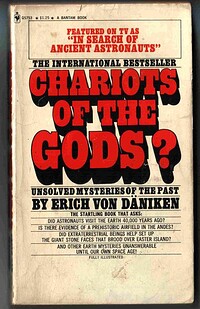Status
Call number
Series
Publication
Description
New Age. Nonfiction. HTML:Now in a beautiful 50th anniversary edition with a new foreword and afterword by the author, this is the groundbreaking classic that introduced the theory that ancient Earth established contact with aliens. Immediately recognized as a work of monumental importance, Chariots of the Godsendures as proof that Earth has been visited repeatedly by advanced aliens from other worlds. Here, Erich von Däniken examines ancient ruins, lost cities, spaceports, and a myriad of hard scientific facts that point to extraterrestrial intervention in human history. Most incredible of all, however, is von Däniken's theory that we are the descendants of these galactic pioneers�??and he reveals the archaeological discoveries that prove it... The dramatic discoveries and irrefutable evidence: �?� An alien astronaut preserved in a pyramid �?� Thousand-year-old spaceflight navigation charts �?� Computer astronomy from Incan and Egyptian ruins �?� A map of the land beneath the ice cap of Antarctica �?� A giant spaceport discovered in the Andes Includes remarkable photos that document mankind's first contact with aliens at the dawn… (more)
Media reviews
User reviews
The late Erich von D was a fraud. He himself knew that much of the "evidence" he presented for extra-terrestrial visitation of Earth was
In his favour it can be said that he aroused enormous worldwide interest in ancient civilisations and their advanced technological capabilities. On the other hand, his presence in this arena has made many real scientists wary of setting foot in it.
You are not entitled to your opinion.
It's not particularly readable, it's horribly dated (the Vietnam War is a "current event," and man had not yet walked on the moon), and well, it's pure bunk. I mean, seriously? I would have been fascinated by this book when I was about ten (and going through my aliens phase), but as a relatively well-read adult combing through these pages, I kept muttering such things as "come on" and "seriously?!?"
The first problem I had was that he takes all mentions of "gods" in ancient cultures seriously. There's apparently no such thing as myth, storytelling, embellishment, falsehood, creative license, etc, etc. Nope, it's ALL true according to von Daniken! And it just really snowballs from there.
Turns out there was nothing new to me in the book. I have seen several speculative history/science TV documentaries that cover the same material.
I
What gets lost in the alien chatter is the many anomalies that are part of the historical/archaeological record for which we have no explanations. So were the ancients much more sophisticated than we believe ? Then you run into the Atlantis crowd, and their naysayers. It seems that there is no serious research attempting to examine the past, without jamming it into the predefined time line and standard script. It may turn out to be the correct depiction of the past, but I would feel better if we at least pretended to look everywhere before we wrote off the 'crackpots'.
The book was a quick read, and only had a few awkward patches due to the translation.
Similarly with the arguments about men on Mars or starships needing people to scratch out landing paths in the dirt are quietly dropped in a God of the Gaps fashion as new science comes in and makes old arguments sound dumb. Especially interesting to note how closely this book lines up with Graham Hancock's alt-history, with many notable staples like the Piri Reis map and the exact same lines about how it "exactly" shows a snow free Antarctica. Hancock has borrowed liberally from Däniken's books but also scoffs and swears off the ancient astronauts as nonsense. There's some scale of plausibility where he's gone close enough to actual history to remain in good graces with people who would dismiss Däniken (even though if you listen deeper than his popular appearances you'll soon find such headscratchers as sonically levitated megaliths).
ORIGINALLY Von Daniken never said anything in the book about Gods or Aliens... he merely listed anomalies such as giant lines whose patterns could only be seen from the air and giant piles of rocks
The theory Von Daniken ACTUALLY postulated before the hysterics mythologized the whole thing was that in our dim and forgotten past there was once one or more races that were capable of space travel, of putting men on the Moon, while the majority of Earth was living in a stone-age (3rd world) condition.
Everything else has been twisted in to make sure our documented history is never questioned.
If you can manage to read Von Daniken without the Alien Gods hysteria clouding your judgment, it WILL give you something to think about - even if it HAS been repeated ad nauseum by now.
Geen ander boek heeft de manier waarop we naar de geschiedenis kijken zo veranderd als Waren de goden kosmonauten? van Erich von Däniken. Hij kon dan ook niet vermoeden dat zijn boek een ware cultklassieker zou worden. Waren de goden kosmonauten? is al 50 jaar onafgebroken in druk en
